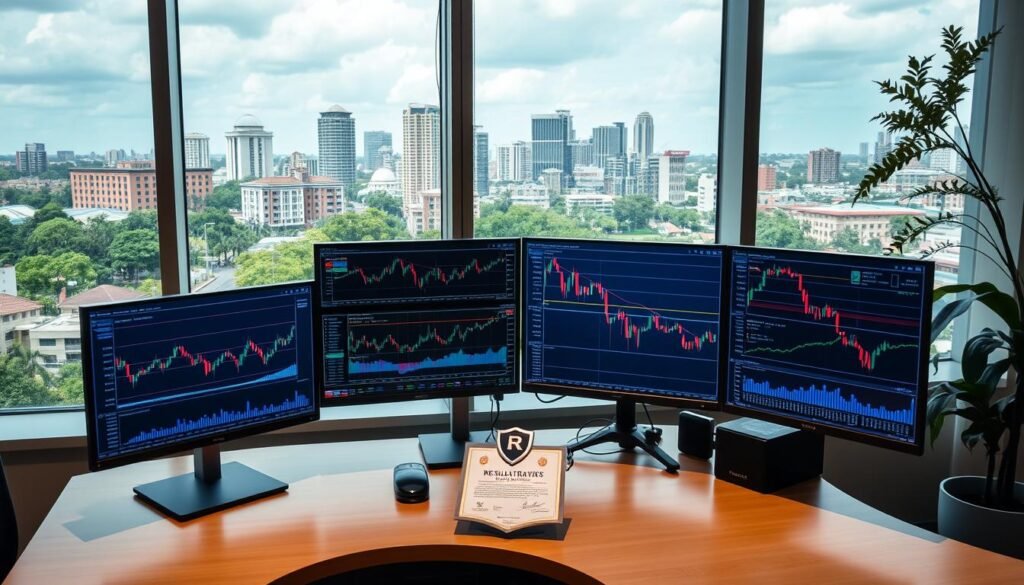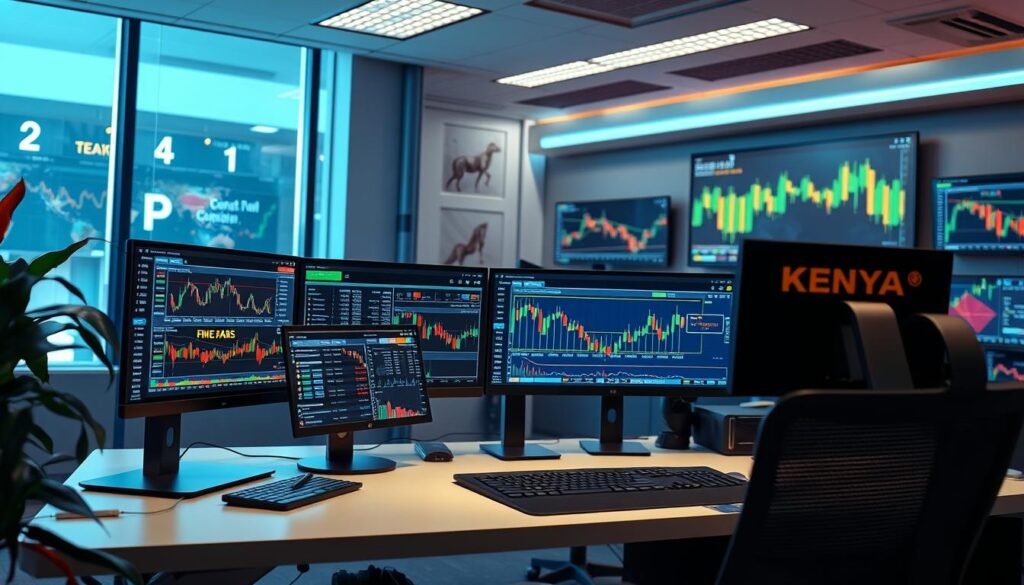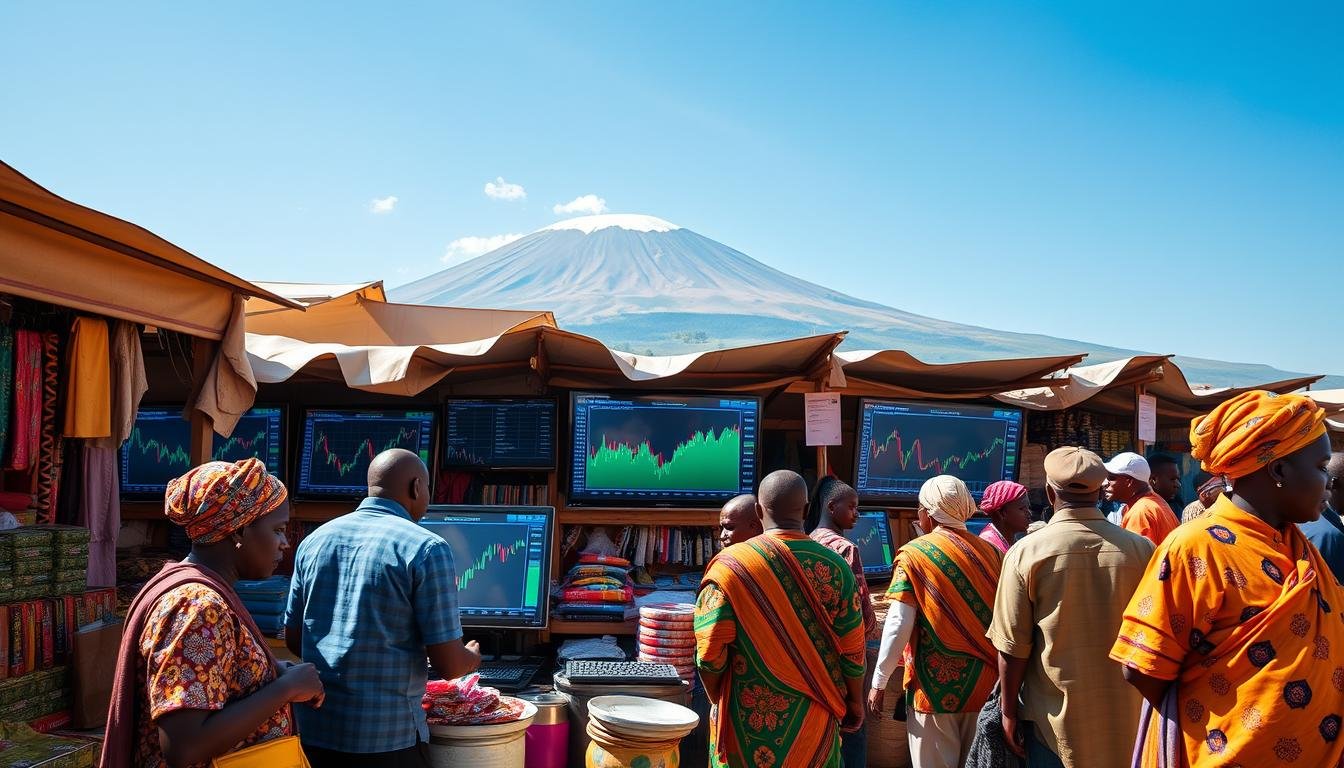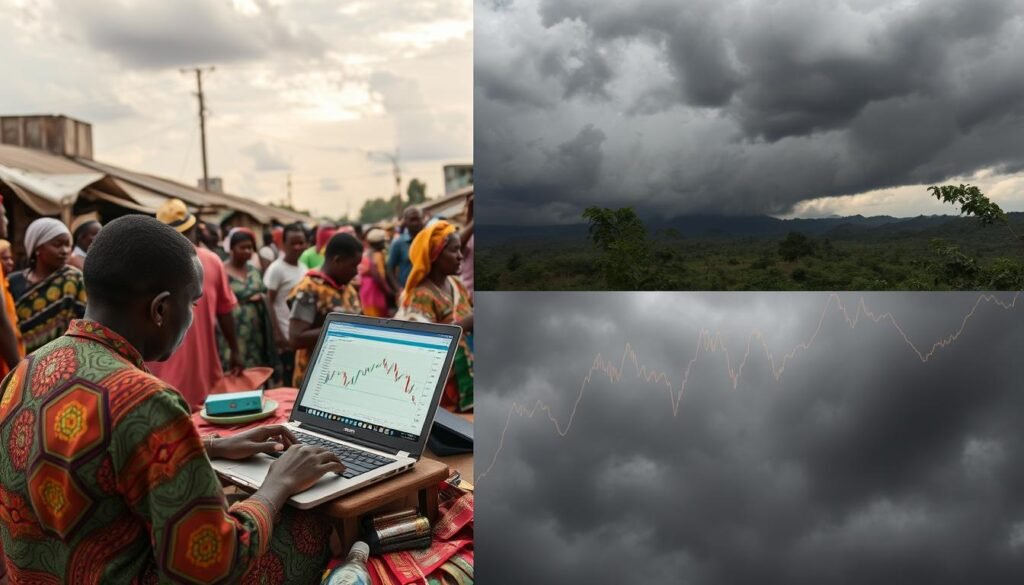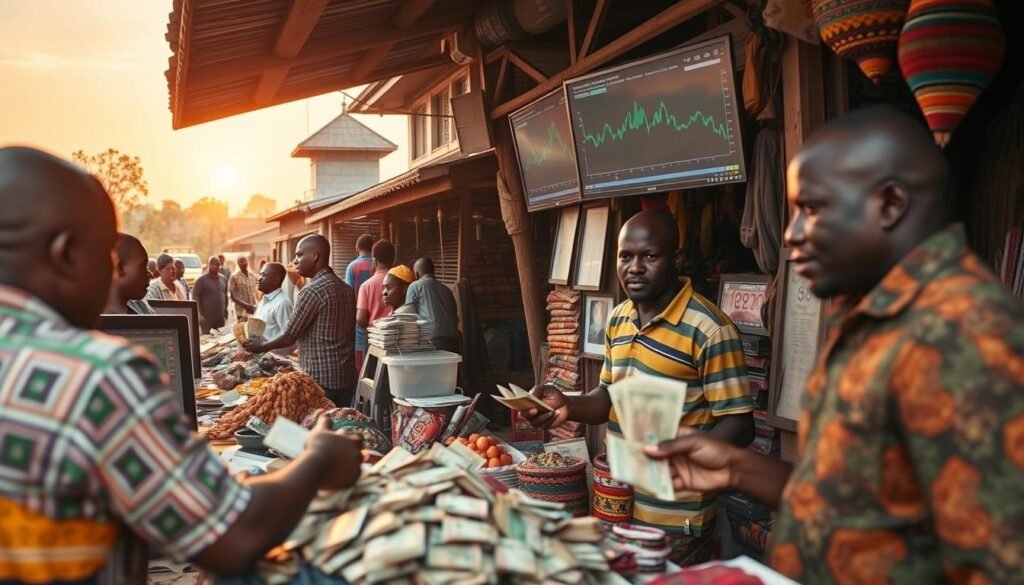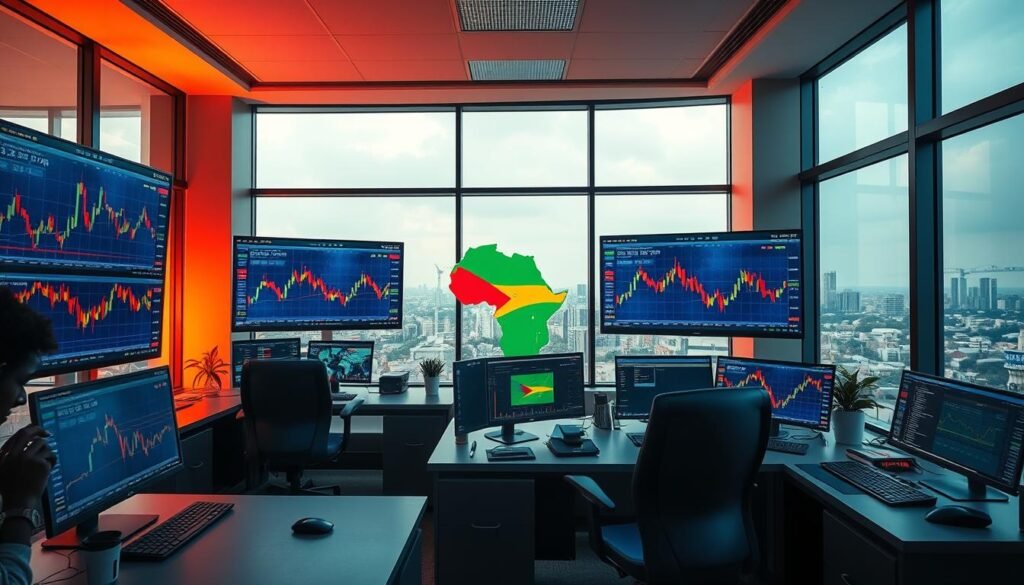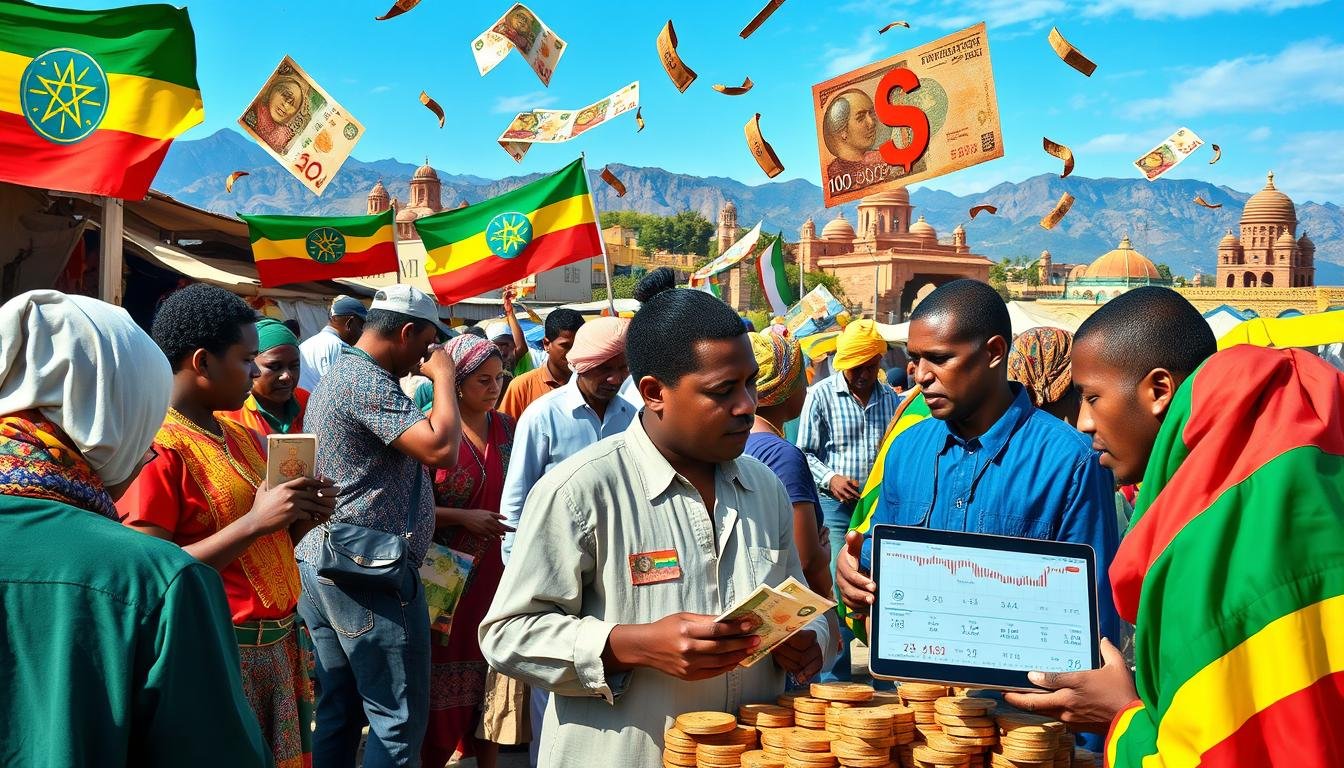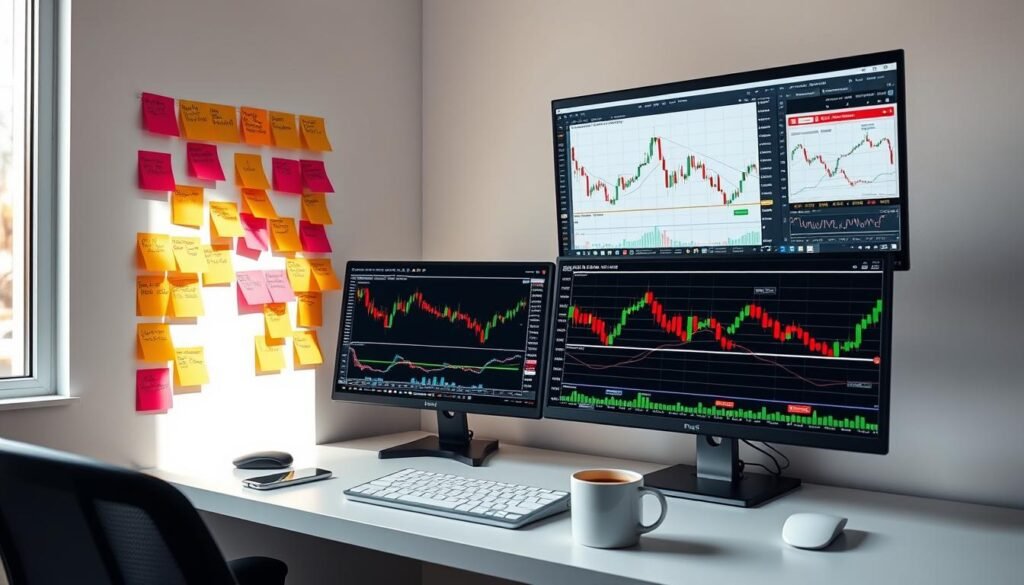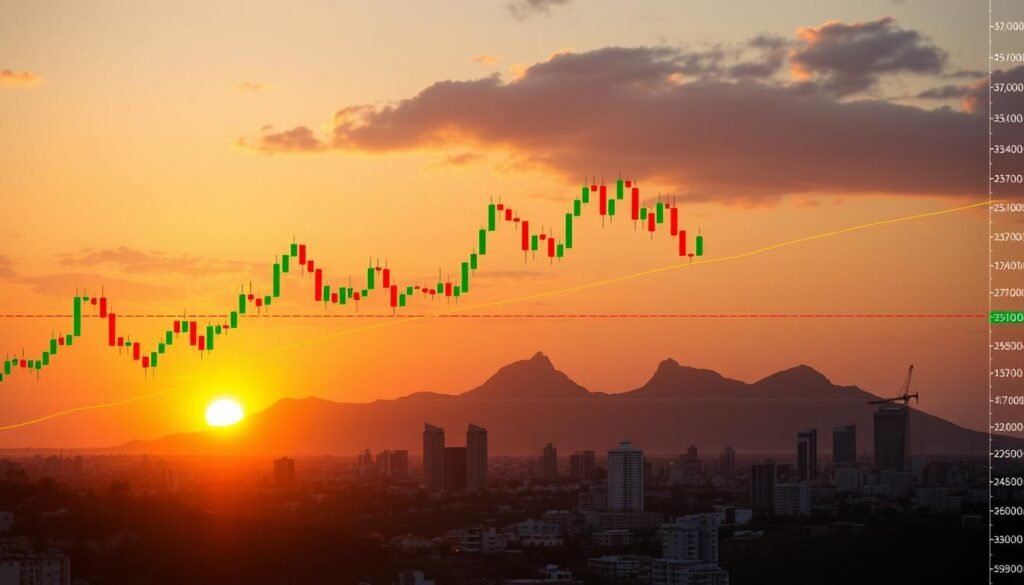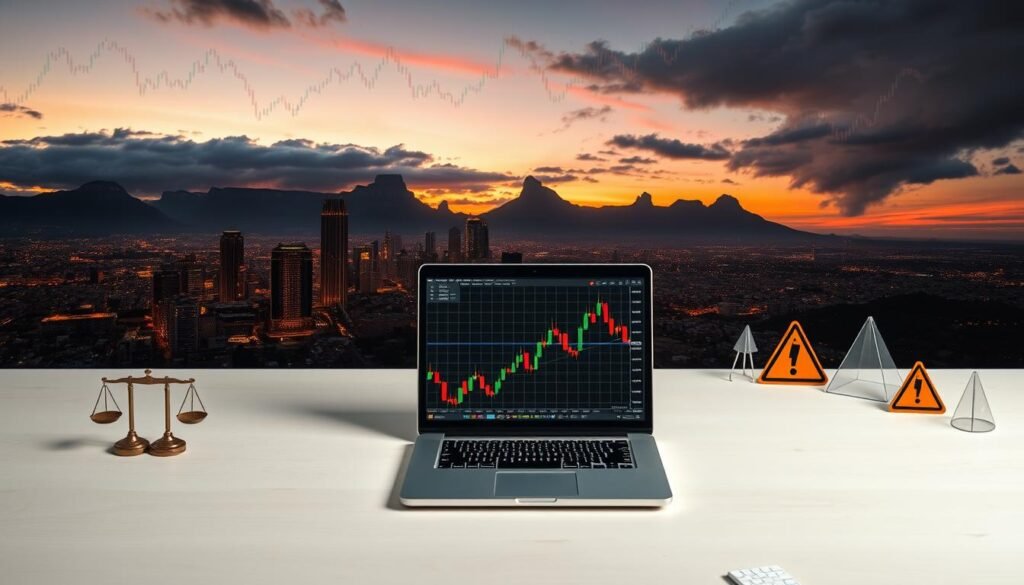Forex Trading for Beginners: Start Your Journey
Welcome to the exciting world of forex trading! If you’re new to the currency markets, this article will guide you. We’ll cover the basics of forex trading for beginners. You’ll learn about the global currency market and the benefits of trading.
The foreign exchange (forex) market is huge, with over $6 trillion traded daily. It offers many chances to make money from currency rate changes. This article will help you start your trading journey with confidence.
Key Takeaways
- Forex trading is the largest and most liquid financial market in the world.
- Forex trading offers the potential for generating additional income and diversifying your investment portfolio.
- Understanding the global currency market, key players, and currency pairs is essential for successful forex trading.
- Mastering technical and fundamental analysis tools and techniques can enhance your forex trading strategies.
- Effective risk management, trading psychology, and a well-defined trading plan are crucial for long-term forex trading success.
What is Forex Trading?
Forex, or the foreign exchange market, is the biggest and most liquid financial market globally. It’s where currencies from different countries are traded against each other. This allows investors to make money from changes in exchange rates. With over $6 trillion traded daily, the forex trading market is full of chances for both new and seasoned traders.
Understanding the Global Currency Market
The global currency market is a big, decentralized place where currencies are traded in pairs. Banks, financial groups, companies, and individual traders all play a part. They all aim to make money from the constant changes in currency values.
Key Players in the Forex Market
The forex market participants are a mix of different groups, each important in the market’s flow and liquidity:
- Central banks: They manage their country’s money and affect exchange rates.
- Commercial banks: They help with transactions and add liquidity to the market.
- Multinational corporations: They trade forex to protect against currency risks and manage global operations.
- Individual traders: They use online platforms to try to make money from quick price changes.
These forex market participants make the global currency market lively and always changing.
Why Trade Forex?
The foreign exchange (forex) market is full of chances for new traders. It lets you make money from currency exchange rates and use leverage and margin. These benefits of forex trading make it a great choice for those starting out.
Flexibility and Accessibility
Forex trading is very flexible. The market is open 24/7, 5 days a week. This means you can trade whenever you want.
This schedule lets you take advantage of market changes. You can adjust to new conditions easily.
Leverage and Margin
Forex trading also has high leverage and margin. This can increase your profits. But, it’s important to manage risks well.
With leverage, you can control big positions with a small investment. But, it can also increase losses. So, always think about risk.
Diversification
- Forex trading lets you diversify your portfolio. You can trade different currency pairs to reduce risk.
- The forex market has many currency exchange rates. This gives you lots of trading options and strategies.
The forex market is dynamic and easy to get into. It offers good returns and portfolio diversification. By knowing the benefits of forex trading, beginners can decide if it’s right for them.
Getting Started with Forex Trading for Beginners
If you’re new to forex trading for beginners, start by learning the basics. This guide will help you understand how to begin. You’ll learn about choosing a forex broker and opening a forex trading account. This will prepare you to start your forex trading journey confidently.
Choosing a Forex Broker
Finding the right forex broker is key to your success. Look at their regulatory status, trading platform, fees, and customer support. Compare different brokers to find the best fit for your trading style and goals.
Opening a Forex Trading Account
After picking a broker, it’s time to open a forex trading account. You’ll need to provide personal and financial details. Some brokers require a minimum deposit. Make sure to follow the steps to activate your account carefully.
Forex trading for beginners is a learning journey. Stay curious and keep learning. Use a demo account to practice before trading live. With the right preparation, you can become a successful forex trader.
“The forex market is the largest and most liquid financial market in the world, offering endless opportunities for those willing to learn and adapt.”
Choosing a Forex Broker
Finding the right forex broker is key to your trading success. The forex market is huge, and the right broker can make a big difference. It’s important to look at several factors to find the best broker for you.
Evaluating Brokers and Trading Platforms
Let’s look at what to consider when picking a forex broker:
- Regulation and Licensing: Choose brokers regulated by top financial bodies like the FCA or CFTC. This means they follow strict rules and protect your money.
- Trading Platforms: Check the broker’s trading platforms. Look for ease of use, customization, and tools for analysis. A good platform makes trading smooth.
- Fees and Commissions: Know the broker’s fees, including spreads and commissions. Compare these to find the best deal.
- Customer Support: Good customer support is vital. The team should be quick to help with any trading issues.
- Execution Speed and Slippage: Fast execution and low slippage are key for success. They help you trade effectively.
| Broker | Regulation | Trading Platforms | Fees | Customer Support | Execution Speed |
|---|---|---|---|---|---|
| XYZ Forex | FCA, ASIC | MT4, MT5, Web Trader | Low spreads, no commissions | 24/7 support, multiple languages | Instant execution, low slippage |
| ABC Investments | CySEC, FINRA | Proprietary platform, mobile app | Competitive spreads, low commissions | Responsive support, email and chat | Fast execution, moderate slippage |
By carefully looking at these factors, you can find the perfect forex broker. This will help you succeed in the market.
Opening a Forex Trading Account
Starting with forex trading can feel overwhelming. But, with the right help, it’s easy and quick. We’ll look at the different account types, what documents you need, and how to fund your account.
Forex brokers offer many account types. You can choose from demo accounts for practice to live trading accounts. It’s key to know what each offers to pick the right one for you.
To open an account, you’ll need to show your ID and proof of address. This is to follow rules about knowing your customers and stopping money laundering.
After setting up your account, you’ll need to add money to start trading. Brokers let you fund accounts with bank transfers, cards, and e-wallets. The amount you need to start can vary, so check before you deposit.
“Opening a forex trading account is the first step towards your trading journey. Take the time to understand the options available and choose the one that best fits your trading goals and risk tolerance.”
Learning about opening a forex account and the options available will help you start your trading journey. Always choose a trusted and regulated broker for a safe trading experience.
Understanding Currency Pairs
Forex trading is all about swapping one currency for another. This is called a currency pair. These pairs show how one currency is worth compared to another. Knowing about these pairs is key to doing well in forex trading.
There are three main types of currency pairs: major, minor, and exotic. Each type has its own characteristics.
Major Currency Pairs
Major currency pairs are the most traded in the forex market. They usually involve the U.S. dollar (USD) with other big global currencies. These include the Euro (EUR), Japanese Yen (JPY), British Pound (GBP), and Swiss Franc (CHF).
These pairs are very liquid and have less volatility. This makes them a favorite for both new and seasoned traders.
Minor Currency Pairs
Minor currency pairs, or cross-currency pairs, don’t include the U.S. dollar. Instead, they are made of other major currencies. Examples are EUR/JPY, GBP/JPY, or EUR/GBP.
These pairs have less liquidity than major pairs. But they offer unique trading chances and can add variety to a trader’s portfolio.
Exotic Currency Pairs
Exotic currency pairs have the U.S. dollar paired with less common currencies. These include the Mexican Peso (MXN), Polish Zloty (PLN), or South African Rand (ZAR).
These pairs are less liquid and more volatile. They are best for experienced traders who can handle higher risks.
| Currency Pair Type | Examples | Liquidity | Volatility |
|---|---|---|---|
| Major Currency Pairs | EUR/USD, USD/JPY, GBP/USD, USD/CHF | High | Moderate |
| Minor Currency Pairs | EUR/JPY, GBP/JPY, EUR/GBP | Medium | Moderately High |
| Exotic Currency Pairs | USD/MXN, USD/PLN, USD/ZAR | Low | High |
Knowing about the different currency pairs is vital for forex traders. It helps them make smart choices and plan their trading strategies. By learning about major, minor, and exotic pairs, you’ll be ready to tackle the ever-changing forex market.
Forex Market Analysis
Successful forex trading needs a deep understanding of market analysis. Traders use two main methods: technical and fundamental analysis. Let’s explore technical analysis and its key tools and techniques.
Technical Analysis Tools and Techniques
Technical analysis looks at past price movements and patterns to find trading chances. Forex traders use many tools and techniques to make smart choices. Indicators like moving averages, oscillators, and chart patterns are very common.
- Moving Averages: These tools help spot trends and track price changes. They give insights into the market’s direction.
- Oscillators: Tools like the Relative Strength Index (RSI) and Stochastic Oscillator show momentum and overbought/oversold conditions. They help traders spot when a trend might change.
- Chart Patterns: Traders study patterns like triangles and head and shoulders to guess future market moves. This helps them plan their trades.
By getting good at these tools and techniques, traders can spot trends and make better choices. Using technical analysis with a solid risk plan is a strong way to tackle the forex market.
| Technical Analysis Tool | Description | Potential Application |
|---|---|---|
| Moving Averages | Smooths out price data to identify trends | Trend identification, momentum analysis |
| Oscillators | Measures overbought/oversold conditions | Detecting potential reversals, momentum analysis |
| Chart Patterns | Recognizes price formations and trends | Anticipating market movements, developing trading strategies |
“In the world of forex, technical analysis is like a roadmap that guides traders through the ever-changing landscape of currency movements.”
Fundamental Analysis in Forex Trading
Technical analysis looks at price movements and patterns. But fundamental analysis in forex trading digs deeper. It studies economic, political, and social factors that affect currency rates. This way, traders can make better choices and possibly win in the market.
Key parts of fundamental analysis in forex trading are:
- Economic Indicators: Watching data like GDP, inflation, and unemployment helps understand a country’s economy. It shows how its currency might move.
- News Events: Keeping up with global news, trade deals, and political stability is key. It affects a country’s economy and currency.
- Macroeconomic Factors: Looking at global trade, commodity prices, and investor mood helps predict currency shifts.
By using fundamental analysis, forex traders get a full picture of currency markets. They can make smarter trading choices.
| Economic Indicator | Impact on Currency |
|---|---|
| Gross Domestic Product (GDP) | Strong GDP growth often leads to a strengthening of the domestic currency, as it signals economic expansion and increased demand for the country’s currency. |
| Inflation Rate | High inflation can weaken a currency, as it erodes the purchasing power of the domestic currency and prompts central banks to raise interest rates. |
| Interest Rates | Increases in interest rates typically lead to a currency’s appreciation, as higher rates attract more foreign investment into the country. |
“Fundamental analysis is the bedrock of successful forex trading. By understanding the underlying economic forces, you can make more informed and profitable trading decisions.”

Risk Management Strategies
Successful forex trading is not just about finding good trades. It also needs a solid risk management plan. We’ll look at key methods to manage your risks and keep your trading capital safe.
Setting Stop Losses and Take Profits
Setting stop losses and take profits is key in forex trading. Stop losses close a trade if it goes against you, limiting losses. Take profits lock in gains when a trade hits a target. These tools help control your trade risks and protect against market ups and downs.
Position Sizing and Diversification
Managing risk in forex trading starts with proper position sizing. It means using the right amount of capital for each trade. This way, a single loss won’t hurt your whole portfolio. Also, spreading your investments across different currency pairs and assets can lower your risk. It helps you handle market changes better.
| Risk Management Strategy | Description | Key Benefits |
|---|---|---|
| Stop Losses | Automatically close a trade when the market moves against your position, limiting potential losses. | Helps control risk and manage volatility. |
| Take Profits | Automatically close a trade when it reaches a predetermined target, locking in gains. | Enables you to capitalize on profitable trades and manage risk-to-reward ratios. |
| Position Sizing | Allocating an appropriate amount of trading capital to each position. | Ensures that a single losing trade doesn’t significantly impact your overall portfolio. |
| Diversification | Investing in multiple currency pairs and asset classes. | Helps mitigate the impact of market fluctuations and reduce overall risk exposure. |
Using these risk management strategies can make you more confident in the forex market. It helps protect your capital. Remember, good risk management is the key to lasting success in trading.
Trading Psychology
Successful forex trading is not just about knowing the market. It also needs a strong grasp of trading psychology. This helps you beat emotional biases that can ruin your trading choices. As a forex trader, understanding your trading psychology is key to lasting success.
Overcoming Emotional Biases
Managing your emotions is a big challenge in forex trading. Traders often face emotional biases that lead to bad decisions. These biases can cause you to take too much risk and lose money. Some common biases include:
- Confirmation bias: Looking for information that backs up what you already believe, ignoring opposing views.
- Anchoring bias: Relying too much on the first piece of information when making decisions.
- Overconfidence: Thinking you control the market and your trading skills more than you really do.
To beat these emotional biases, you need discipline and good risk management strategies. This means setting clear rules, using stop-loss orders, and keeping an eye on your emotions while trading.
“Successful trading is as much about managing your emotions as it is about analyzing the markets.”
By tackling your emotional biases, you can make better trading choices. This can lead to more profits and success in the forex market.
Leverage and Margin
Leverage and margin are key in forex trading. Leverage lets traders manage big positions with little capital. This can lead to big wins or losses. But, it also means more risk.
Margin is the capital needed to start and keep a position. It’s the money you must have to use leverage. Managing both well is key to success and keeping risk low.
Understanding Leverage and Margin
Leverage is shown as a ratio, like 1:100 or 1:200. This means you can control a big position with just $1. But, it also means big risks. It’s important to know and manage these risks well.
Margin is the capital needed to start and keep a position. It’s a small part of the total position size, set by your broker. Keeping enough margin is vital to avoid losing your position.
| Leverage Ratio | Margin Requirement | Potential Gains/Losses |
|---|---|---|
| 1:100 | 1% | Significant |
| 1:50 | 2% | Moderate |
| 1:20 | 5% | Limited |
Higher leverage means bigger gains but also bigger risks. Finding the right balance between rewards and risks is crucial in forex trading.
“Leverage is a double-edged sword – it can amplify your profits, but it can also amplify your losses. Prudent risk management is essential for successful forex trading.”
Developing a Trading Plan
Making a detailed trading plan is key to success in forex trading. It acts as a guide, helping you make decisions and reach your financial goals. At its core, your plan defines your trading style, which shapes how you interact with the market.
Defining Your Trading Style
Finding your trading style is vital for a good plan. Are you into swing trading for medium-term gains? Or do you enjoy the quick action of day trading? Maybe you like the slow, steady pace of position trading.
It doesn’t matter which you choose. The goal is to match your style with your risk level, resources, and personal preferences. Knowing your strengths and weaknesses helps you craft a plan for lasting success.
| Trading Style | Timeframe | Risk Management | Advantages |
|---|---|---|---|
| Swing Trading | Medium-term (days to weeks) | Moderate risk with stop-loss orders | Capture larger market moves, less time commitment |
| Day Trading | Short-term (minutes to hours) | Strict risk management with tight stop-losses | Capitalize on intraday volatility, potential for quick profits |
| Position Trading | Long-term (weeks to months) | Disciplined risk management, focus on fundamental analysis | Ride major market trends, lower time commitment |
By matching your trading style with your risk level and preferences, you can create a plan for long-term success in forex.
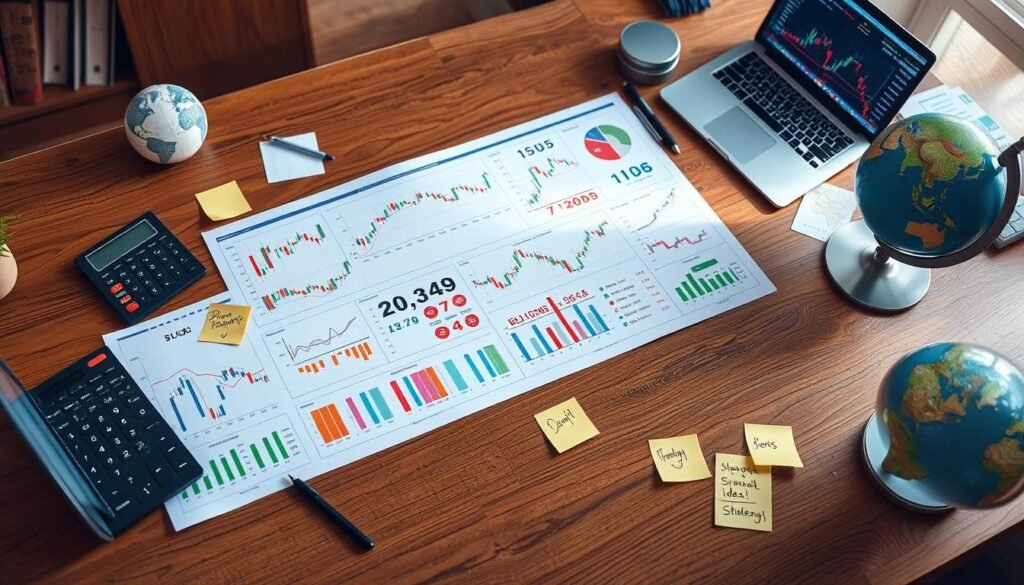
Forex Trading Strategies
As a beginner in the forex market, you’ll find many trading strategies to explore. Each strategy has its own way to make money from market movements. They match different trading styles. Let’s look at some popular strategies to help you start.
Trend-Following Strategies
Trend-following strategies aim to follow the market’s direction. They ride the trend to profit from sustained price movements. Traders use tools like moving averages and trendlines to follow the trend.
Scalping Strategies
Scalping is about making many small trades to profit from small price changes. Scalpers hold their positions for just a few minutes or seconds. This strategy needs quick execution and careful risk management.
Swing Trading Strategies
Swing trading aims to capture medium-term price swings. It lasts from a few days to weeks. Traders use chart patterns and technical indicators to find good times to enter and exit the market.
Position Trading Strategies
Position trading involves holding positions for weeks or months. It focuses on large market trends. Traders rely on fundamental analysis to find long-term opportunities. This strategy needs patience and a long-term view.
Success in forex trading depends on understanding the market, your risk tolerance, and learning. Try different strategies to find the best fit for you.
| Forex Trading Strategy | Description | Time Frame | Key Factors |
|---|---|---|---|
| Trend-Following | Riding the momentum of prevailing market trends | Medium to long-term | Trend identification, moving averages, momentum indicators |
| Scalping | Profiting from minor price fluctuations through frequent, short-term trades | Short-term (minutes to seconds) | High-speed execution, strict risk management |
| Swing Trading | Capturing medium-term price swings | Medium-term (days to weeks) | Chart patterns, support/resistance levels, technical indicators |
| Position Trading | Capitalizing on long-term market trends | Long-term (weeks to months) | Fundamental analysis, economic indicators, geopolitical events |
Currency Exchange Rates
Understanding currency exchange rates is key for successful forex trading. These rates change all the time, showing the fast pace of global finance. Traders make money by guessing how currency pairs will move.
Many things affect currency exchange rates. Economic data, political events, and market mood are big factors. For example, a country’s GDP, inflation, and interest rates can change its currency value. Also, trade deals and political stability play a big role.
| Currency Pair | Current Exchange Rate | Daily Change | 52-Week Range |
|---|---|---|---|
| EUR/USD | 1.1850 | +0.23% | 1.1234 – 1.2050 |
| USD/JPY | 110.25 | -0.18% | 108.50 – 111.75 |
| GBP/USD | 1.3925 | +0.11% | 1.3450 – 1.4150 |
To understand currency pair movements, traders need to know about base currency and quote currency. The base currency is the one being quoted. The quote currency shows the value of the base currency. For instance, in EUR/USD, the euro is the base currency, and the U.S. dollar is the quote currency.
“Mastering currency exchange rates is the key to unlocking the full potential of the forex market.”
By watching currency exchange rates closely and knowing what affects them, traders can find good trading chances. They can make smart choices in the fast-moving forex market.
Trading Tools and Resources
Forex trading is complex and ever-changing. Successful traders use many tools and resources to succeed in the global currency market. We’ll look at valuable forex trading tools, platforms, and educational resources to help you on your trading path.
Forex Trading Tools
To trade forex well, you need the right tools. These tools help you analyze markets, make trades, and manage risks. Key tools include:
- Charting software like MetaTrader 4 or 5, TradingView, or NinjaTrader for technical analysis
- Economic calendars to keep up with market events
- Currency pair calculators for figuring out lot sizes and potential profits or losses
- Automated trading systems, or expert advisors, for executing trades based on strategies
Trading Platforms
The platform you choose affects your trading experience. Here are some top platforms for forex traders:
- MetaTrader 4 (MT4) – Known for its advanced features and tools
- MetaTrader 5 (MT5) – Offers more features than MT4, including economic calendars
- cTrader – Easy to use with advanced order types and tools
- TradingView – A cloud-based platform with a large community and many tools
Educational Resources
Learning is key in forex trading. There are many resources to improve your knowledge and skills. These include:
- Online forex trading courses and tutorials
- Forex trading blogs and industry publications
- Webinars and live trading sessions with experienced traders
- Trading forums and online communities for connecting with other traders
Using these tools, platforms, and resources can give you an edge. They help you make better trading decisions and improve your forex trading skills.
Conclusion
You’ve finished learning the basics of forex trading for beginners. You now know how to understand the forex market and manage risks. These steps will help you become a successful trader.
Stay focused, keep learning, and always follow your trading plan. This will help you reach your goals.
The forex market is full of chances for those who learn and work hard. You’ve learned about currency rates and trading strategies. This knowledge will help you in the fast-changing world of forex.
Keep checking your progress and adjust your strategy as needed. Never stop learning. With hard work and dedication, you can succeed in forex trading. Good luck with your trading journey.
FAQ
What is Forex Trading?
Forex, or foreign exchange, is trading one currency against another. It’s the biggest and most liquid market globally, with over trillion traded daily.
What are the Benefits of Forex Trading?
Forex trading has many benefits for beginners. You can profit from currency rate changes. It offers high leverage and 24/7 trading.
How Do I Get Started with Forex Trading?
To start, learn the basics and choose a good broker. Open a trading account and learn about currency pairs and market analysis.
How Do I Choose a Forex Broker?
Look at a broker’s regulation, fees, platform, support, and reputation. This ensures a safe and reliable trading experience.
What are the Different Types of Currency Pairs?
Currency pairs are major, minor, and exotic. Major pairs include the U.S. dollar with other big currencies. Minor pairs are between major currencies, and exotic pairs are from emerging markets.
How Can I Analyze the Forex Market?
Market analysis uses technical and fundamental approaches. Technical analysis looks at price patterns and historical data. Fundamental analysis examines economic and political factors.
What Risk Management Strategies Should I Use?
Good risk management is key. Use stop losses, practice proper position sizing, and diversify your portfolio. This minimizes risk.
How Can I Overcome Emotional Biases in Forex Trading?
Understanding trading psychology and managing emotions are crucial. Overcome biases, stay disciplined, and make decisions based on your plan, not impulse.
How Does Leverage Work in Forex Trading?
Leverage lets you control large positions with small capital. But it also increases risk. It’s important to manage these risks well.
What are Some Popular Forex Trading Strategies?
Popular strategies include trend-following, scalping, swing trading, and position trading. Each has its own approach. Find the one that fits your style and goals.


